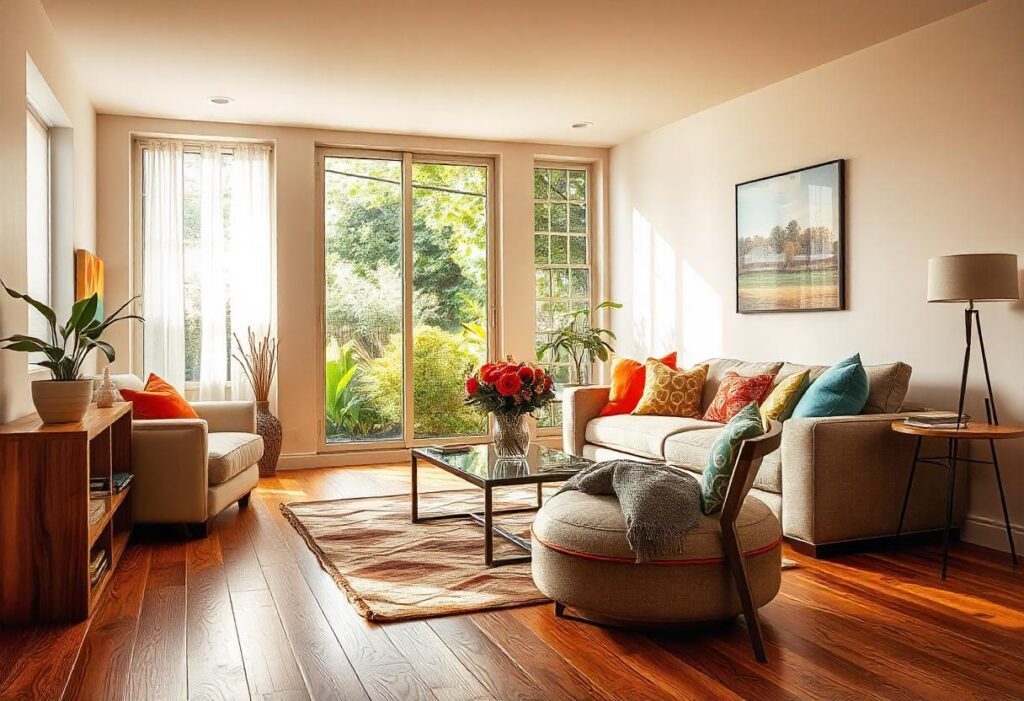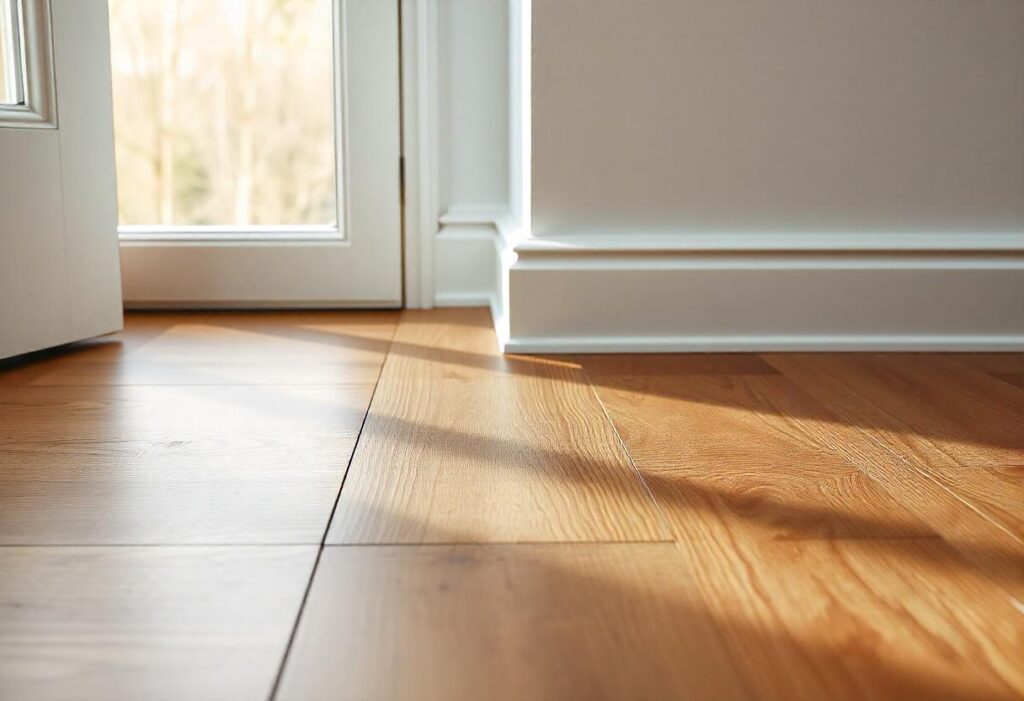Transforming your basement can take different amounts of time. Simple updates might only take a week. But, a full basement makeover could take a month or longer.
Knowing what affects your basement remodel’s time is key. It helps you plan and manage your project well. A good basement remodel can improve your life and increase your home’s value.
The time it takes to renovate your basement depends on several things. These include the size, how complex it is, and your approach. Knowing the usual times for different projects helps you set realistic goals.
It also makes your home improvement journey smoother. By understanding what affects the timeline, you can prepare for a basement remodel that fits your needs and schedule.
Understanding Basement Remodeling Basics
Basement remodeling turns an unused space into a cozy living area. It involves tasks like installing walls and insulation. You also upgrade flooring, lighting, plumbing, and electrical systems.
More detailed projects might include waterproofing and adding windows or doors. Custom storage solutions are also part of the process.
What Constitutes a Basement Remodel
A basement remodel includes several key elements:
- Framing walls for separate rooms or open layouts
- Insulating walls and ceilings for better energy efficiency
- Installing new flooring like laminate or engineered hardwood
- Upgrading lighting, outlets, and wiring
- Plumbing for bathrooms, wet bars, or kitchenettes
- Finishing touches like drywall, painting, and custom built-ins
Initial Assessment Requirements
Before starting a basement remodel, an initial assessment is crucial. It helps determine the project’s scope, budget, and timeline. This involves checking the space’s current state and any structural or moisture issues.
Planning the desired layout and functionality is also key. A thorough assessment ensures a smooth project and successful completion.
The Average Timeline for Basement Renovations
Starting a basement renovation project is thrilling. Yet, knowing the usual time frame is crucial. On average, it takes 8 to 11 weeks to finish a basement makeover. This depends on the project’s size and complexity.
The journey starts with design and planning, lasting 2 to 8 weeks. This phase includes making a detailed plan, picking materials, and getting permits. The construction phase, which covers framing, electrical, plumbing, and finishing, usually takes 5 to 7 weeks. Adding 1 to 2 weeks for the final check and touch-ups completes the project.
In total, a basement renovation can take 12 to 16 weeks, or 3 to 4 months. This time can vary based on the basement’s size, any special features, and the availability of materials and workers. Knowing the basement renovation duration helps homeowners plan better. It ensures a smooth and efficient basement makeover timeline.
Factors Affecting Your Basement Remodel Duration
When planning your basement remodel, several key factors come into play. These include the size and scope of the renovation, structural complexities, and permit requirements. Understanding these can help you set realistic expectations for your project.
Size and Scope Considerations
The size of your basement greatly affects the remodel duration. A smaller basement, under 500 square feet, might take 2 to 3 weeks. But a larger one, around 1,000 square feet, could need 4 to 6 weeks or more.
Adding complex designs or specialized features, like extra rooms or custom built-ins, can also extend the time. These require more planning, construction, and inspections, adding to the schedule.
Structural Complexities
Structural issues or layout changes can significantly impact your remodel’s timeline. Projects with plumbing, electrical work, or moving load-bearing walls take longer than simple cosmetic updates.
The condition of your structure, the need for permits, and the complexity of renovations all play a role. These factors can extend your basement remodeling schedule.
Permit and Inspection Requirements
The permit and inspection process can also influence your remodel’s duration. Depending on local rules, you might need permits for various aspects of the work. This can lead to delays if not managed well. For instance, for a basement remodel in Long Island, NY, permits are required for construction, egress compliance, and energy code adherence. Submit plans, schedule inspections, and obtain a Certificate of Occupancy. Missing permits may result in fines, safety risks, or resale issues.
Passing inspections during construction is crucial. It helps keep your project on schedule. Ensuring inspections are done promptly and thoroughly is key.
Design and Planning Phase Timeline
The design and planning phase is key for a basement upgrade. It usually takes 2-8 weeks. This phase includes important steps that lay the groundwork for your basement’s new look.
It starts with an initial consultation. Here, you and the renovation team work together. You’ll create plans that fit your budget and expectations. Next, you finalize designs, pick fixtures, and make detailed plans. This stage clearly outlines the renovation’s scope, making sure everyone knows the project’s goals and timelines.
- Initial Consultation: Discuss your vision, requirements, and budget with the renovation team.
- Design Development: Collaborate with designers to create plans that meet your needs and preferences.
- Fixture Selection: Choose the right fixtures, materials, and finishes for your basement upgrade.
- Detailed Planning: Develop a comprehensive renovation plan, including timelines, milestones, and budgets.
This phase is vital for setting the project’s scope and expectations. Spending time here helps the construction process run smoothly. It ensures your basement upgrade meets your timeline and budget.
Construction Phase Breakdown
Starting a basement renovation is thrilling, but knowing the timeline is key. The construction phase usually takes 5 to 7 weeks. It involves several important steps that shape the whole project.
Framing and Structural Work
The first step is framing and structural work. This part takes 2 to 3 days. Contractors build the walls, floors, and support beams for your basement.
Electrical and Plumbing Installation
Once the structure is ready, the electrical and plumbing systems are installed. This step takes about 2 days. Professionals add wiring, lighting, and plumbing to fit your basement’s design.
Drywall and Finishing Work
After the electrical and plumbing are done, drywall installation starts. This takes up to 3 days. Then, mudding and sanding add 4 to 6 days. Painting the walls takes 4 days, and flooring and trim installation takes 3 to 4 days.
The basement construction timeline and the basement renovation stages can change. This depends on your project’s size, any unexpected issues, and permits or inspections. Talking to a professional contractor can give you a clearer idea of your project’s timeline.
Professional vs. DIY Timeline Differences
Choosing between a professional basement remodel or a DIY project affects your timeline. This decision is crucial for your basement renovation.
Benefits of Hiring Professionals
Hiring pros for your basement remodel has many benefits. They know the laws, ensure good ventilation, and manage the project well. This expertise can make your project faster and better.
Common DIY Timeline Setbacks
DIY basement renovations can be rewarding but face challenges. Without experience, you might run into delays and mistakes. You’ll also need to learn new skills and handle permits and safety.
The cost for a DIY basement project is $5,000 to $7,000. But, DIY projects can lead to more costs and delays. Professional contractors offer a faster and more reliable timeline, but at a higher cost.
Managing Your Remodeling Schedule
Effective basement remodel project management is key to keeping your project on schedule. It involves clear communication, realistic expectations, and planning ahead. Professionals manage different phases, schedule work well, and tell you about any delays quickly.
Start by setting clear goals and a budget. Think about when you want the project done, like before school starts. Work with your remodeler to finalize plans and pick materials before starting to avoid delays and extra costs.
Choose a reputable remodeler who knows local rules and regulations. Their knowledge helps keep your project moving smoothly. The pre-construction phase usually takes one to four months. The actual construction time depends on the project’s size.
- Establish clear project goals and a realistic budget
- Determine the optimal timeline for project completion
- Work with your remodeler to finalize plans and selections before construction
- Understand local regulations and inspection requirements
- Communicate regularly with your remodeler to monitor progress and address any issues
When you manage your basement remodel project management well, you can keep your renovation timeline in control and basement makeover scheduling on track. This leads to a successful and timely basement renovation.
Cost Implications of Project Duration
The time it takes to finish your basement can really affect the cost. The average cost to finish a basement is between $30 to $50 per square foot. This means the total cost can range from $15,000 to $75,000. The scope of work and how long it takes can change the final cost.
Open floor plans are usually cheaper than having multiple rooms. Finishing part of your basement can cost between $2,500 to $20,000.
Budget Planning Tips
When planning your budget, remember that labor costs are a big part. They can be 20% to 40% of the total cost. Longer projects can cost more because of more labor and possible price changes in materials.
It’s smart to have a little extra money in your budget. This is for any unexpected delays or changes that might happen during the project.
Timeline-Related Expenses
There are other costs besides construction. Things like permit fees, architectural design fees, and contractor overhead can add up. These can be 15% to 20% of the total cost.
Fixing structural issues or dealing with mold can also increase costs. The amount depends on how much work is needed. Knowing these costs can help you manage your budget better and ensure your project goes smoothly.
Final Words
Having your basement remodeled is an exciting venture that can significantly enhance your home’s functionality and value. The duration of such a project varies based on factors like size, complexity, and planning. When you understand these elements and prepare accordingly, you can ensure a smooth renovation process that aligns with your expectations.
At Creative Design Ceramic Tile & Bath, we bring over 38 years of experience to your remodeling projects. As a family-owned and operated business based in Lake Grove, NY, we are fully licensed and insured, ensuring that all work is performed to the highest standards of safety and excellence. Our commitment to quality craftsmanship and exceptional customer service has made us a trusted partner in the Suffolk County area. We take pride in delivering reliable and personalized solutions that meet your unique needs.
If you’re considering a basement remodel, we invite you to discuss your vision with us. Our team is dedicated to bringing your ideas to life, ensuring a seamless and stress-free renovation experience. Contact us today to explore customized options and receive expert insights for your home improvement project.





